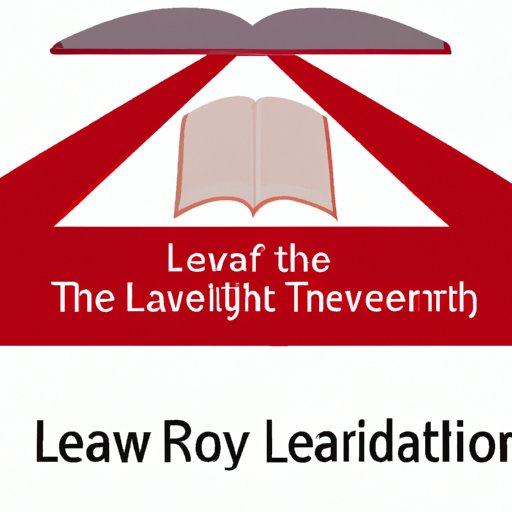I. Introduction
Are you considering a career in law but unsure of how to begin? Pursuing a career in law can be challenging, but with the right education and preparation, you can succeed. In this article, we will examine the various steps and education required to become a lawyer. From undergraduate education to law school and beyond, we will discuss everything you need to know to pursue a rewarding career in law.

II. The Path to Law: How to Become a Lawyer through Education
Becoming a lawyer requires several steps, including completing undergraduate education, attending law school, passing the bar exam, and participating in continuing legal education (CLE).
Undergraduate Education: Most aspiring lawyers earn a bachelor’s degree in a field that complements their legal studies, such as political science, history, or economics. While there is no specific degree required for law school admission, completing a rigorous undergraduate curriculum can prepare you for the rigor of law school.
Law School: Law school typically lasts three years and introduces students to the principles of law. A juris doctor (J.D.) degree is required to practice law in the US. During law school, you will study a wide range of legal topics and hone your legal writing, research, and advocacy skills.
The Bar Exam: After completing law school, you must pass the bar exam in the state where you intend to practice. The bar exam is a comprehensive test of legal knowledge and proficiency, and candidates must pass it to gain admission to the bar and practice law.
Continuing Legal Education: Once you’ve passed the bar exam, CLE courses are crucial to maintaining a current understanding of new laws, legal trends, and best practices in the field.
III. The Core Curriculum for Aspiring Lawyers
To succeed as a lawyer, certain core skills are essential to develop. These skills include legal writing, negotiation, and moot court practice. Legal writing proficiency enables lawyers to draft legal documents, such as contracts and briefs, and effective persuasive writing is crucial for litigation. Negotiation skills are essential for negotiation of contracts, settlements, and plea deals. Moot court practice is helpful in perfecting courtroom advocacy skills.
There are numerous ways to hone these skills, such as by participating in clinical programs, taking courses, and attending skills workshops.
IV. Navigating the Law School Admissions Process
Selecting a law school program is essential to your legal career. When choosing a law school, consider factors such as location, size, specialties, and cost. The Law School Admission Test (LSAT) is a crucial component of the application process, and individuals should take the LSAT seriously and prepare thoroughly in advance.
Additionally, admission committees seek to admit well-rounded candidates. Strong application essays and personal statements, participation in extracurricular activities, and securing letters of recommendation from mentors or professors are vital components of success during the law school admissions process.
V. Specialized Legal Education: Beyond Law School
Various specialized programs offer a more comprehensive understanding of specific legal fields, such as intellectual property law, environmental law, or health law. Specializations enable lawyers to gain an in-depth understanding of their preferred area of law and are a valuable asset in their practice.
When selecting a specialization, consider your interests, job market demand, potential for advancement, and expected salary. Pursuing additional education can enhance your professional network and increase your job opportunities.
VI. Alternative Education Pathways to a Successful Law Career
For individuals who do not wish to pursue traditional education or cannot afford it, apprenticeships, online and distance learning programs and law-related internships offer an alternative pathway to becoming a lawyer. Though not as comprehensive as a formal legal education, these programs allow students to gain practical experience and knowledge through hands-on learning in legal workplaces.
It is essential to consider the credibility and reputation of an apprenticeship or internship program and any associated training or credentials before committing to any alternative education pathway.
VII. The Role of Continuing Legal Education in a Successful Lawyer Career
Continuing legal education is an essential component of a successful legal career. CLE courses enable lawyers to stay current with new legal trends, best practices, and technologies required to maintain relevant knowledge and proficiency in the field. Many states require lawyers to earn a certain number of CLE credits every year, and it’s essential to stay up-to-date with the requirements to maintain licensure.
VIII. Building Your Legal Network: The Importance of Law School Connections
Networking is crucial to building a successful legal career. Law school provides a great opportunity to establish valuable connections with fellow students and distinguished alumni. Networking enables new lawyers to establish professional relationships, secure job opportunities, and receive critical mentorship, advice, and support.
Investing time and effort in building relationships through alumni groups, legal organizations, conferences, and social media platforms is vital to create a broad network of legal professionals.
IX. Conclusion
Becoming a lawyer requires years of education, hard work, and dedication. From undergraduate education to specialized law programs to continuing legal education, there are numerous education pathways to success in the legal field. By developing core skills, navigating the law school admissions process, and building a strong professional network, aspiring lawyers can successfully pursue a rewarding legal career.
